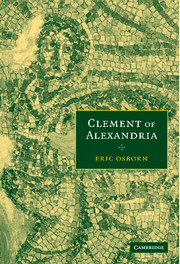Book contents
- Frontmatter
- Contents
- Preface
- List of abbreviations
- 1 Life and works
- PART I DIVINE PLAN/ECONOMY
- PART II DIVINE RECIPROCITY
- PART III FAITH AND SALVATION
- 7 The Spark and ferment of faith (exc 1.1.3)
- 8 Arguments for faith
- 9 Knowledge, sciences and philosophy
- 10 Church and heresy
- 11 Twofold hope
- 12 Love and reciprocity
- Conclusion
- Appendix: Irenaeus and Clement
- Select Bibliography
- Subject index
- Citations from Clement
- Citations from the Bible
- Citations from ancient authors
9 - Knowledge, sciences and philosophy
Published online by Cambridge University Press: 06 July 2010
- Frontmatter
- Contents
- Preface
- List of abbreviations
- 1 Life and works
- PART I DIVINE PLAN/ECONOMY
- PART II DIVINE RECIPROCITY
- PART III FAITH AND SALVATION
- 7 The Spark and ferment of faith (exc 1.1.3)
- 8 Arguments for faith
- 9 Knowledge, sciences and philosophy
- 10 Church and heresy
- 11 Twofold hope
- 12 Love and reciprocity
- Conclusion
- Appendix: Irenaeus and Clement
- Select Bibliography
- Subject index
- Citations from Clement
- Citations from the Bible
- Citations from ancient authors
Summary
PAUL AND UNIVERSAL KNOWLEDGE
Has Clement argued so effectively for faith that he cannot give much place to philosophy or any other form of knowledge? His epistemology begins from the Corinthian letters of Paul, from the majesty of faith which depends not on the wisdom of men, but on the power of God. However, Paul, in the same chapters where he establishes the autonomy of faith, finds a place for a deeper knowledge which he commends to the Corinthians. He begins (1 Cor. 1:5) with the prayer that they might be enriched in Christ in all logos and all knowledge, that they might have the one firm foundation in Christ and at the same time receive every charisma. As he turns to the immediate problem of schisms at Corinth, he declares the centrality of faith in Christ crucified. This word of the cross is folly to those who are on the way to destruction, but to those who are being saved, it is the power of God (1 Cor. 1:18). The wisdom of the wise will be destroyed because God has made it appear foolish. Paul preaches Christ crucified, which is a scandal to the Jews and folly to the Gentiles, but the power and wisdom of God to those who are called. There are not many wise men among the faithful at Corinth, but Christ has become their wisdom just as he has become their divine source of righteousness, sanctification and redemption.
- Type
- Chapter
- Information
- Clement of Alexandria , pp. 197 - 212Publisher: Cambridge University PressPrint publication year: 2005



